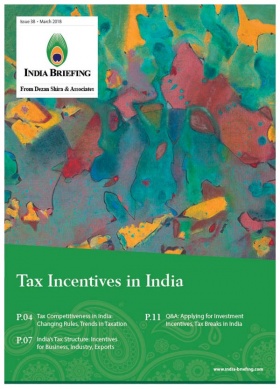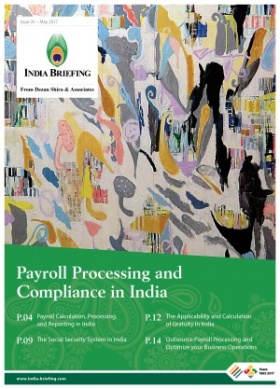Data Centers in India: Growing Digitization Creates Opportunity for Investment
As more industries in India develop information technology (IT) solutions to improve delivery capacity and adopt new business models to match global innovation trends, India’s dependence on global data centers is becoming problematic.
Data centers store, process, and analyze data for business use, and is a critical asset for the digital economy.
Currently valued at US$2.2 billion (Rs 143 billion), India’s data centers market is expected to reach US$4.5 billion (Rs 292 billion) by the end of 2018.
This makes investing in homegrown digital infrastructure, including the set-up to host data services, crucial to India’s economic and digital growth.
It is also an area of focus for the government’s Digital India initiative, launched in 2015, which aims to secure access to electronic services and internet connectivity across the length and breadth of India.
Here we discuss the factors behind India’s growing demand for local data centers, in particular, the country’s rapidly modernizing banking, financial services, and insurance sector.
BFSI sector digitization fuels need for local data centers
Data centers are the heart of operations for the modern banking, financial services, and insurance (BFSI) sector.
This sector is rapidly moving towards digitization, and any further transformation will be reliant on the hosting services powering it – taking into account the scale, speed, and security of the data that is required.
Indian companies in this sector are expanding at a fast pace with a compound annual growth rate (CAGR) of 12-15 percent, and increasingly confront the growing preference for online facilities.
The trend has created a new business model, labeled by industry experts as ‘servitization’, which sees a shift from focusing on the physical product offering to the technological solution and digitally delivered service. It has also powered the rise of India’s financial technology sector.
The necessary shift in value proposition due to external demand has made the integration of digital services a fundamental part of BFSI operations in India, meaning that data processing and storage requirements are rising at exponential rates.
To manage this exponential growth, BFSI firms need access to high efficiency, large data storage facilities.
Consequently, the sector is beginning to move away from traditional captive data centers to an outsourced model where organizations lease space and host servers from external providers.
Regulatory complications, the insecurity of hosting data beyond Indian borders, and expenses involved in setting up and operating separate data centers are key factors stimulating the demand for localized third party data center operators in India.
 India’s FDI policy for IT service verticals
India’s FDI policy for IT service verticals
India allows 100 percent foreign direct investment (FDI) through the automatic route for the following IT services and related verticals:
- Data processing;
- Software development and computer consultancy services;
- Software supply services;
- Business and management consultancy services;
- Market research services; and,
- Technical testing and analysis services.
By 2025, the Indian IT and business process management (IT-BPM) sector’s revenue is estimated to reach US$350 billion (Rs 22,974 billion). Moreover, IT-BPM firms are increasingly opting for data center solutions from third party providers to leverage cost effectiveness and achieve high organizational efficiency.
India is thus poised to be the second largest market in the Asia-Pacific for data centers by 2020. Organizations will do well to leverage this rapidly growing demand and invest in data centers in India.
India’s regulatory framework for data centers
The Information Technology (Reasonable Security Practices and Procedures and Sensitive Personal Data or Information) Rules notified in 2011, governs the security of data collection in India. All data centers have to adhere to the rules provided, and any breach can lead to fines or imprisonment in case of criminal activity.
Under the Information Technology Rules, data center operators are required to meet the International Standard IS/ISO/IEC 27001 or ‘any other code prescribed by an industry association and approved by the Indian central government’.
However, the federal government has approved no such code and there is no clarity on when this code might be notified.
Further, India’s Information Technology Act, 2000 is a relatively new law with no specific provisions for data centers.
These regulatory gaps have often caused confusion in India as its technology startups and services industries continue to innovate IT solutions.
For example, a recent directive by the central bank, Reserve Bank of India, asked digital payment companies to set up in-country data storage facilities within six months, throwing sudden challenges to firms operating or starting out in the newly developing sector.
Data hosting in India: Challenges and opportunities for investors
While there is a push to develop data centers in India, and large companies such as Oracle, Google, and Amazon are leveraging this market – companies need to be aware of potential downsides.
Apart from the lack of regulatory clarity, water supply shortages and intermittent electricity supply in India could be problematic for data center operators. Cooling systems and servers, among other mechanisms, are dependent on these and would become non-functional – leading to loss of data or security breaches. Creating backups for either scenario is costly.
Taxes on real estate and buying large land parcels to set up a data center can be challenging as well.
In this aspect, India’s tier 2 and 3 cities could prove more reliable, offering affordable real estate options and lower labor costs.
In addition, India’s Special Economic Zones (SEZs) and Software Technology Parks (STPs) set up in these locations provide businesses with various tax and non-tax incentives and infrastructural support to promote IT infrastructure development.
Currently, most data centers in India are based near tier 1 cities, leaving open the market opportunities in tier 2 and 3 cities.

At the level of public administration, online governance mechanisms such as GST and Aadhaar have contributed to the need for national information storage centers in India. This has led the government to pitch for State Data Centers, offering business incentives to private players and the option to establish private-public partnerships in the sector.
Meanwhile, both public agencies and private sector telecom firms like Airtel and Reliance Jio are investing heavily in fiber optic internet cables to improve connectivity and internet speeds across India, especially in SEZs and STPs.
With the goal to meet global standards by 2020, these investments will prove advantageous for foreign firms setting up digital infrastructure in India.
About Us
India Briefing is produced by Dezan Shira & Associates. The firm assists foreign investors throughout Asia and maintains offices in China, Hong Kong, Indonesia, Singapore, Vietnam, and Russia.
Please contact india@dezshira.com or visit our website at www.dezshira.com.
- Previous Article Fixed-Term Employment: Now Open to All Employers in India
- Next Article Taxation in India: Changing Rules, Trends in Taxation















